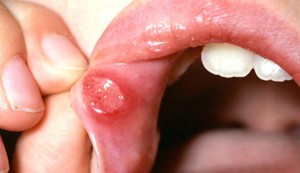 Around one in five people in the United Kingdom get them repeatedly, they are oval sores that form in your mouth and are usually white, red, yellow or grey in colour and are inflamed. We are of course talking about mouth ulcers.
Around one in five people in the United Kingdom get them repeatedly, they are oval sores that form in your mouth and are usually white, red, yellow or grey in colour and are inflamed. We are of course talking about mouth ulcers.
Although ulcers can be uncomfortable, especially when you eat, drink or brush your teeth, they are usually harmless and should heal within 10-14 days. If your ulcer gets worse or lasts for more than three weeks, see your local GP or dentist. In a small number of cases, a long-lasting mouth ulcer could be a sign of mouth cancer.
Mouth ulcers are often caused by damage to the mouth, for example by accidentally biting the inside of your cheek while eating, or from a sharp tooth, food or filling.
Mr Rhodri Williams, consultant maxillofacial surgeonat Solihull Hospital, highlights some other causes: “You can get mouth ulcers that keep coming back, mainly at times when you’re particularly stressed, anxious or run down.
“Your diet can play a part too and there are foods that may increase the likelihood of you getting a mouth ulcer including: chocolate, coffee, peanuts, almonds, strawberries, cheese, tomatoes and wheat flour.
“Stopping smoking may mean that you temporarily develop mouth ulcers, which is a normal reaction while your body is coping with chemical changes. If you are trying to quit smoking, don’t be put off if you develop mouth ulcers. Ulcers are temporary and the long-term health benefits of not smoking are far greater than the short-term discomfort of the ulcers.”
So what can you do to prevent getting mouth ulcers? Mr Williams explains: “Try to keep your mouth as clean and healthy as possible and use a soft toothbrush to clean your teeth.
“Avoid hard, sharp, spicy and acidic foods and drinks until the ulcer heals – try and stick to soft foods that are easier to chew. Eating a good diet which is rich in vitamins A, C and E, and includes foods such as fresh fruit and vegetables will help to reduce the risk of developing ulcers.
“As mouth ulcers can come about if you are feeling stressed, you can reduce your stress levels by doing an activity that you find relaxing, such as yoga, meditation or exercise.”
For more information on mouth ulcers, visit the NHS Choices website (www.nhs.uk).
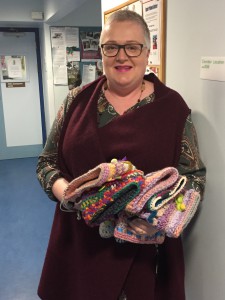 A member of staff at Heart of England NHS Foundation Trust and volunteers from the Lingard House ‘knit and natter’ group in Walmley are putting their craft skills to the test by making twiddle muffs for patients with dementia. And they are looking for donations of wool, buttons and ribbons to help them.
A member of staff at Heart of England NHS Foundation Trust and volunteers from the Lingard House ‘knit and natter’ group in Walmley are putting their craft skills to the test by making twiddle muffs for patients with dementia. And they are looking for donations of wool, buttons and ribbons to help them.
Twiddle muffs are hand muffs decorated with ribbons, large buttons or textured fabrics that patients with dementia can twiddle in their hands whilst on the elderly wards at Heartlands, Solihull and Good Hope Hospitals. People with dementia often have restless hands and like something to keep them occupied. The twiddle muffs provide a source of visual, tactile and sensory stimulation at the same time as keeping hands snug and warm.
An avid crocheter, operations manager for women’s and children’s services at the Trust, Angela McKenna-Hylton got the idea from other Trusts who use the muffs – and has a target of making 100 twiddle muffs this year.
Irene Britton, a member of the knit and natter group at Lingard House in Walmley, which is run by the Sutton Coldfield Charitable Trust, contacted the Trust to see if there were any projects the group could get involved with, and is helping Angela meet her target. Irene said: “My sister made a twiddle muff for my brother-in-law and he enjoyed having it so I thought it would be a nice gesture for me and the ladies to help and give something back for the wonderful care he received at Heartlands Hospital.”
Angela said: “We are hoping that people will generously donate their spare bits of wool, buttons, and ribbons so they can be put to good use and make more twiddle muffs. They are an excellent way of helping to combat the restlessness and agitation that may be experienced by patients with dementia. This project is part of a wide range of work we are doing to support our patients with dementia and we would love to have your help.”
Please send any haberdashery you would like to donate to:
Angela McKenna-Hylton, care of the children’s outpatients department, Heartlands Hospital, Bordesley Green East, Birmingham, West Midlands B9 5SS.
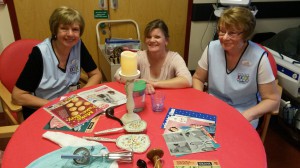 Solihull Hospital is appealing for kind-hearted volunteers to spend time with elderly patients and help prevent delirium, a common condition affecting up to one in three patients over the age of 70.
Solihull Hospital is appealing for kind-hearted volunteers to spend time with elderly patients and help prevent delirium, a common condition affecting up to one in three patients over the age of 70.
Patients with delirium can be confused, agitated, drowsy, less mobile and they can have hallucinations. Although it’s a short-term condition, the effects can be long-term and distressing, with potentially longer stays in hospital and a higher chance of developing dementia in the future.
There are several factors which can cause delirium, but the most common are pain, infection and changes to medication. Even something as simple as constipation can cause a case of delirium for a vulnerable patient, especially those aged over 65 or who may already have dementia.
The good news is that, with specialised care, up to a third of new cases of delirium can be prevented and you don’t have to be a nurse or doctor to help. Solihull Hospital is looking for volunteers to spend time on wards with patients, carrying out everyday activities such as encouraging eating and drinking, helping with orientation and supporting activity such as playing card games or doing jigsaws.
Volunteers will receive training from specialised hospital staff and are asked to dedicate a minimum of three hours a week but can volunteer for as many as they would like to.
Phillip Hall, senior nurse for dementia at Solihull Hospital, said: “Delirium is a condition which is rarely talked about and people are often too embarrassed to mention it after they recover.
“It can be very traumatic with some patients having frightening hallucinations or delusional beliefs and it can cause a great deal of anxiety and distress. The outcomes can also be very serious, with increased stays in hospital and the chances of developing a new dementia rising by six times.
“Our volunteers bring a much-needed sense of wellbeing to our elderly patients and just spending time with them talking or drinking tea, makes a huge difference because it keeps their lives as normal as possible while they are in hospital and helps us to prevent people developing this serious condition.”
If you think you can offer your time and care to support elderly patients, please contact Phillip Hall or a member of the Dementia and Delirium Outreach Team on 0121 424 4277, e-mail phillip.hall@heartofengland.nhs.uk or follow them on Twitter @DADOTSH1.
Cervical cancer is the most common cancer in women aged 35 and under with around eight women in the United Kingdom diagnosed with the disease every day.
The aim of Cervical Cancer Prevention Week is to highlight the importance of cervical screening, commonly known as a smear test and how attending a screening invitation can help to prevent cervical cancer. It is also an ideal time to help raise awareness of the disease.
Cervical cancer develops in a woman’s cervix and is caused by a persistent infection with a virus called human papillomavirus (HPV) which leads to cervical cells being damaged.
When reality TV star, Jade Goody died of cervical cancer at aged 27, this led to an increase in the number of women having screenings. But this surge has now dropped, with recent figures showing that one in four women still do not attend their appointments.
Mr Raj Saha, consultant gynaecologist and lead for cancer services at Heart of England NHS Foundation, explains: “If you have received an invitation to go for your routine cervical smear then please do not ignore the letter. The test should take no more than 15 minutes and could save your life.
“Cervical screening, available to all women aged between 25 and 64, is one way of preventing cervical cancer as it detects any abnormalities on the cervix which if left untreated could lead to cancer. Cervical screening is a simple and painless procedure and with early detection and treatment it is estimated to prevent up to 75 per cent of cervical cancers.
“We urge women to book an appointment with their GP as soon as they receive their reminder or to contact their GP if they think their screening is due. If you are over 25 and you haven’t received a letter inviting you for a test, contact your local GP surgery who can make the necessary arrangements.”
Even though screening is effective, you should see your GP if you notice any unusual symptoms. For example, if you bleed after sex or between periods. Symptoms of cervical cancer are not always obvious at first and there are sometimes no symptoms with early stage cervical cancer. There are however recognised symptoms associated with cervical cancer as highlighted below:
- Discomfort or pain during sex;
- Lower back pain;
- Leg swelling;
- Bone pain.
For more information on cervical cancer, visit www.jostrust.org.uk. You can also join in the conversation on Twitter by following @JoTrust and using the hashtag #SmearForSmear to get more people talking about the importance of attending smear tests.
Cervical Cancer Prevention Week takes place between 24-30 January 2016.
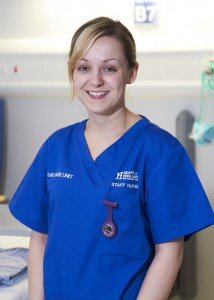 Location: Birmingham Heartlands Hospital B9 5SS
Location: Birmingham Heartlands Hospital B9 5SS
Venue: Education Centre
Date: 6 February 2016 from 10am to 6pm
Description: Do you have a current, active nursing (NMC) pin?
Are you an experienced adult or paediatric registered nurses who has the passion, dedication and commitment to provide excellent clinical care, in a fast paced and exciting clinical environment?
Are you a newly qualified nurse who desires to work in a fast pace ED hospital setting?
Come and talk to us at our open day on Saturday 6 February 2016, where we are showcasing the career opportunities our emergency unit has to offer.
The day will include:
- Introduction to clinical skills (e.g. plastering, suturing, BLS sessions)
- Presentation outlining our excellent ED nurse development programmes (including top-up degree, academic accreditation and pathways into advanced nursing practice in Emergency Care)
- Tours of the Emergency department
- Specialist interview panels on the day for those who have been shortlisted. (A nursing drugs calculation test will be part of the interview process).
- Letters of conditional offers of appointment for successful candidates will be given on the day.
Click here to watch Jess Parker tell us about her journey to becoming an ED nurse practitioner.
Anyone interested in the career opportunities can find out more by attending the open day, which will be held at:
Birmingham Heartlands Hospital
Education Centre
Bordesley Green Road
Birmingham
B9 5SS
For more information please visit the NHS Jobs website and search using the reference number: 295-20171BB
To discuss the career opportunities further please call 0121 424 3091 to speak to:
Matron – Hilary Clemson
hilary.clemson@heartofengland.nhs.uk
Senior Sister – Joanne Gallagher
joanne.gallagher@heartofengland.nhs.uk
Paediatric Lead – Maxine Tomlinson maxine.tomlinson@heartofengland.nhs.uk
www.jobs.nhs.uk
 A mother of two who underwent a four hour operation to remove a 6.5cm bowel tumour has praised the team at Good Hope Hospital who saved her life.
A mother of two who underwent a four hour operation to remove a 6.5cm bowel tumour has praised the team at Good Hope Hospital who saved her life.
Anna Pinnell, 54, from Streetly, was diagnosed with a stage three bowel cancer when she attended the emergency department at Good Hope Hospital with constipation and pain in her stomach. The tumour had completely blocked the bowel and the team decided that emergency surgery was the only option. Anna was rushed to theatre and consultant colorectal and general surgeon, Mr Haney Youssef, carefully removed the large tumour. He was also able to join the bowel back together, without the need for Anna to have a permanent colostomy bag – something that is quite unusual in this kind of surgery and especially on large tumours.
Anna’s story had started the year before when she started to feel tired and a bit down, so visited her GP who arranged blood tests that showed she was anaemic. Anna – thinking it was probably the menopause – started taking iron tablets. She took two a day for nearly a year, but the tablet masked the changes that were already happening in her bowel movements. When she later started getting cramps and stomach pains, she put it down to the stress of helping to organise her son Stuart’s wedding and her daughter Lucy’s 30th birthday party.
Anna began getting crippling pain in her stomach and after two days, her partner insisted on taking her to the emergency department at Good Hope Hospital where the cancer was diagnosed and quickly removed. Because there were some cancer cells found in her lymph nodes after the surgery, Anna also underwent chemotherapy treatment for six months. Although she didn’t lose her hair, the three-weekly chemotherapy cycle left her extremely tired and because the diagnosis and surgery had happened so quickly, in shock. She still has some lingering side effects from the chemotherapy, but has been reassured by her consultant clinical oncologist, Dr Good, that these will gradually get better.
Anna admits that if anyone reading could take something from her story – it’s not to self-diagnose and if you’re worried about your health, please see your GP. She said: “I wish I had paid more attention to my symptoms and not assumed that I knew what the problem was. It was a complete shock to be told that I had a late stage tumour and it all happened so quickly. I am really grateful to Mr Youssef, Dr Good and the teams who looked after me and helped me to deal with my diagnosis.
“I was fully expecting to wake up with a colostomy bag after my surgery and to find out that Mr Youssef had managed to save my remaining bowel so I didn’t need one, was a huge relief. It’s given me back a quality of life I wasn’t expecting to have.”
Anna, who works as a personal shopper for Tesco online, is returning to work this month after nearly a year off. She is currently cancer free and will have check-ups every six months. Her daughter Lucy lives at home and was there to help her through her treatment and Anna said that the support of her family and friends has been amazing.
Mr Youssef, consultant colorectal and general surgeon, said: “Anna’s tumour was fairly advanced and had it been left any longer, she would have almost certainly had to lose a lot more of her bowel and would have had a permanent stoma bag fitted. I am pleased Anna is doing so well after her treatment and I’d also like to reiterate that if you have symptoms you are worried about – please see your GP.”
The symptoms of bowel (colorectal) cancer can include:
- Bleeding from the back passage (rectum) or blood in your poo
- An unexplained change in normal bowel habits
- A lump that your doctor can feel in your back passage or abdomen (more commonly on the right side)
- A feeling of needing to strain in your back passage (as if you need to pass a bowel motion), even after opening your bowels
- A lower than normal level of red blood cells (anaemia)
VuDo (view do) – QR Codes; Improving patient experience and staff competence
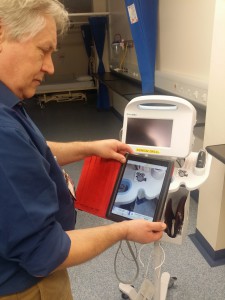 QR codes have been introduced to improve patient experience and staff competence, by providing short learning video at the point of use, of medical devices, at Heart of England NHS Foundation Trust.
QR codes have been introduced to improve patient experience and staff competence, by providing short learning video at the point of use, of medical devices, at Heart of England NHS Foundation Trust.
Medical devices that have been problematic to use in the past will now have an individual code attached in a prominent position and when scanned deliver a specific video between 30 seconds to 3 minutes, of how to use the device.
Paediatric Physiotherapist, Laura Butler said, “in the past, senior staff would receive phone calls at home in the early hours of the morning from both nurses and parents of patients who were experiencing difficulty, to coach them on the use of a nebuliser or NIV (non-invasive inhaler).”
Faculty Educator and developer of VuDo at the Trust, Simon Potter said, “we identified the nebuliser as one of the first applications for the QR codes, staff and patients can now scan the QR code to refresh themselves on any one of the eight inhalers and nebulisers devices we prescribe”.
Quick Response (QR) Codes are 2-dimensional images made up of dots which can be scanned by smartphones and tablets with a free QR code reader app. They contain over 230 times more data than barcodes. This allows access to web pages, social media, and can sync with an Outlook calendar, geo-locate, email, and text.
Today QR codes, like barcodes, can be overlooked. In order to help staff identify and understand the codes, they have been embedded onto a camera icon and referred to as VuDo (view do) to encourage recognition and action.
VuDo will also be used in the Trust to help implement new equipment, for examples Welch Allyn vital signs devices that measure key signs about a patient, such as blood pressure and oxygen levels.
Implementing the devices along with the associated training has been a big clinical project. The use of the QR codes has supported staff post training and helped them become more familiar with the device.
Nurse Trainer, Janette Cross said, “we explain how the VuDo works to staff when we deliver the initial training and hope that it will make it much easier for staff to find information quicker, and patients receive the care they need more efficiently”.
VuDo works best where information is needed promptly without the need to hunt for paper-based material or log onto a computer. Simon said, “other uses of VuDos include staff induction, enriching posters and leaflets, interactive hospital maps and emailing engineers of device breakdowns and plan to create 3 new VuDos later in the year.
Find out more about it here: https://www.youtube.com/watch?v=FYt1wdFCQw0 and try VuDo yourself here, using a QR reader
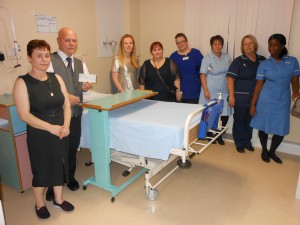 A local couple has raised £3,500 for the hospital they were treated at in memory of their baby boy, Micah, who was stillborn in 2012.
A local couple has raised £3,500 for the hospital they were treated at in memory of their baby boy, Micah, who was stillborn in 2012.
Charlotte Nall, aged 32 from Solihull and husband Gavin, raised the funds to refurbish the bereavement room on ward 1 at Heartlands Hospital to give families who have lost a child a more comfortable environment.
For Charlotte, going through this difficult time was the driving force behind the decision to write a book to support bereaved families enduring miscarriage, stillbirth and neonatal death, and from there to set up the Charity Littlefingers. The Nalls have organised fundraising events and received donations from friends, family and local businesses including Aston Villa Football Club who teamed up with Clements 83, from Birmingham’s Coronation Football League to host a charity football match.
Charlotte said: “We found the staff at Heartlands to be absolutely brilliant in what was for us extremely emotional circumstances. We wanted to do this to show our gratitude and also make sure other families in such a dark and difficult time are given the best possible care.
“We were blown away by the kindness of strangers. The money will go towards more furnishings for the room including pictures, a stereo and a reclining sofa for partners to sleep on so that they can be there to comfort the ladies as they go through this awful time.”
Rachel Small, a midwife at the hospital, said: “We are so thankful to Littlefingers, staff and Aston Villa Football Club for the generous donation to refurbish the bereavement room. It is important to give couples a pleasant private room during the saddest day of their life.”
Littlefingers are holding a black tie charity ball on Saturday 16th April at St John’s Hotel in Solihull to raise funds to refurbish the bereavement room at Good Hope Hospital. For further information about the event, see littlefingers.org.uk
If you are interested in fundraising for your local hospital, call the fundraising team on 0121 424 3838, or email fundraising@heartofengland.nhs.uk
 Locals are to benefit from a better understanding of bariatric surgery procedures and the most effective thanks to a new study underway at Heartlands Hospital.
Locals are to benefit from a better understanding of bariatric surgery procedures and the most effective thanks to a new study underway at Heartlands Hospital.
With obesity levels in the UK having almost trebled in the last 30 years despite a general better understanding of the underlying causes of the condition, the By-Band-Sleeve study hopes to address some of these issues.
Current national guidelines recommend that surgery is considered for people with severe and complex obesity. This surgery is known as bariatric surgery. Three of the most common types of bariatric surgery operations are: the adjustable gastric band (‘Band’), the Roux-en-Y gastric bypass (‘Bypass’), and the gastric sleeve (‘Sleeve’).
At the moment, health professionals do not know which of these three operations is the most effective for long-term weight loss and improvement of health problems and quality of life. Choice of surgery is based on a combination of clinical opinion and patient choice.
Consultant bariatric & upper GI surgeon, Mr Rishi Singhal, principal Investigator for the study at Heartlands, believes this way of working needs to change: “We need to give advice to patients based on clinical evidence, not personal opinion. We need to know which operation is most effective and who it’s most effective for. Based on that information, we can make informed decisions about which type of surgery to recommend, safe in the knowledge it is the most cost effective choice for the NHS.”
Dr Jeremy Kirk, clinical director of the Clinical Research Network: West Midlands said: “People need more options. Clinical research will play a vital role in developing better and more cost effective treatments for people who are obese. Crucially, it also looks at the reasons for weight gain, which can help us address long-term solutions for the causes and development of the condition.”
The study is funded by the National Institute for Health Research (NIHR) and co-ordinated from the Clinical Trials and Evaluation Unit at the University of Bristol.
To find out more about the clinical research into obesity being supported by the National Institute for Health research, visit www.crn.nihr.ac.uk/bigchallenge
To find out more about the By-Band-Sleeve study, visit: http://www.by-band.bristol.ac.uk/home/
NOTES TO EDITORS
- About the By-Band-Sleeve study
The By-Band-Sleeve Study is currently running at eleven hospitals: Heartlands Hospital, Birmingham, Royal Bournemouth and Christchurch Hospitals, St James University Hospital, Leeds, Sunderland Royal Hospital, Musgrove Park Hospital, Taunton, Royal Cornwall Hospital, Truro, Queen Alexandra Hospital, Portsmouth, Royal Derby Hospital, Derby, University Hospital Southampton, Homerton Hospital, London and St Mary’s Hospital Imperial College, London.
Adults who are referred for bariatric surgery at any of these hospitals can take part in the study. Patients are given some information to read about the study and the chance to discuss it with the health professionals on the team. Those who agree to take part will have an equal chance of being assigned a gastric band, a gastric bypass, or a gastric sleeve. This allows the three types of operations to be compared in a balanced way. Participants will be told which operation they have been assigned to several weeks before their actual operation date. It is planned that 1341 patients will take part in the study in total.
After surgery, participants will be followed up carefully, including regular weight checks. They will be asked to complete questionnaires about their quality of life and use of healthcare. Some participants will also be interviewed about their experience. Researchers will also ask participants to provide two blood samples for future research into obesity, in addition to the samples people would give as part of their normal care. All participants will be followed up by the study team for three years.
The study is coordinated from the Clinical Trials and Evaluation Unit at the University of Bristol and involves a team of experts, including researchers from the Universities of Bristol, Birmingham and Oxford, and health professionals from each of the study hospitals.
The study started in 2012 and will run for approximately eight years, until the final patient has completed follow-up.
Funding
The study is funded by the National Institute for Health Research Health Technology Assessment Programme (ref: 09/127/53). Any views or opinions expressed are those of the authors and do not necessarily reflect those of the HTA programme, NIHR, NHS or the Department of Health.
Following the outcome of the Junior Doctors ballot by the BMA the impending NHS industrial action is scheduled to take place from 8am Tuesday 12th January to 8am Wednesday 13th January.
Heart of England NHS Foundation Trust will endeavour to ensure that, wherever possible, patients’ care at Good Hope, Solihull and Heartlands Hospital are not disrupted.
All emergency services including A&E and emergency surgery services will be unaffected.
Unless you have been contacted directly advising you of a cancellation, please attend your procedure or appointment as planned.







